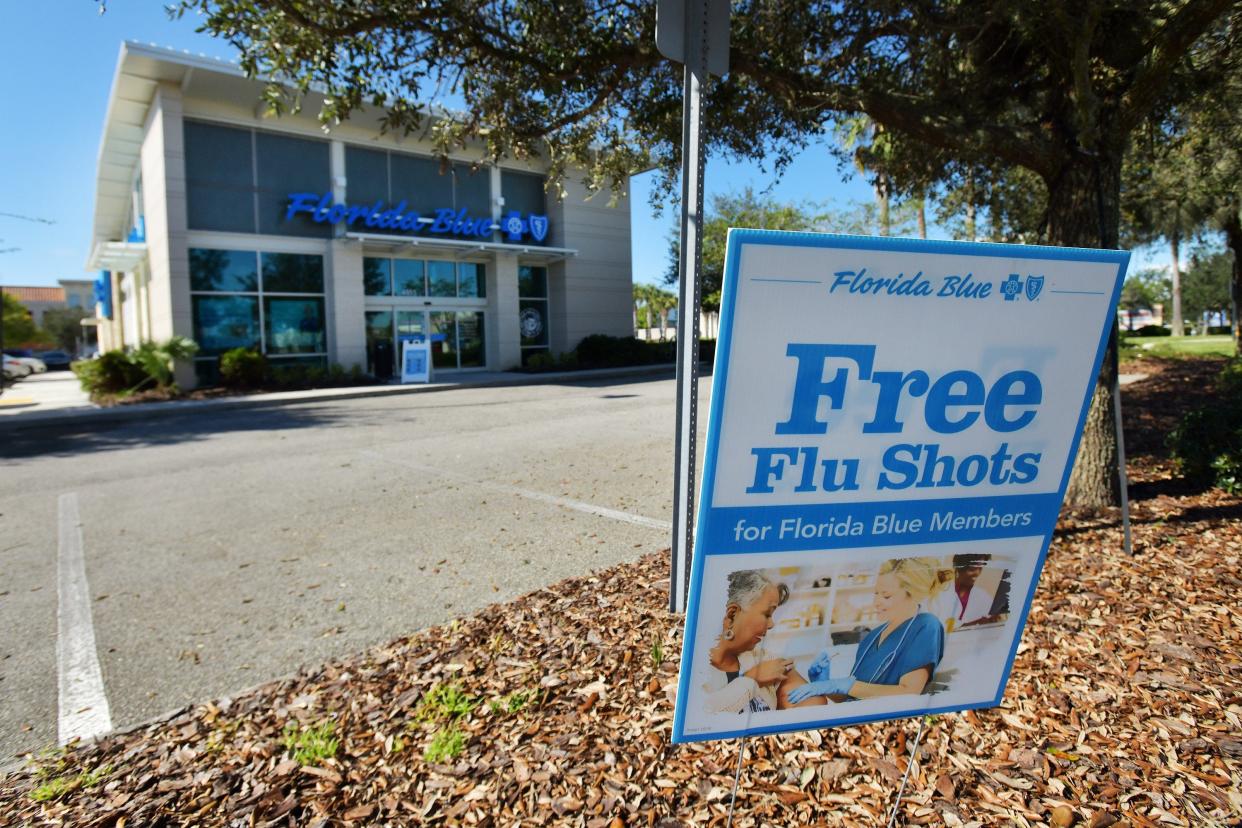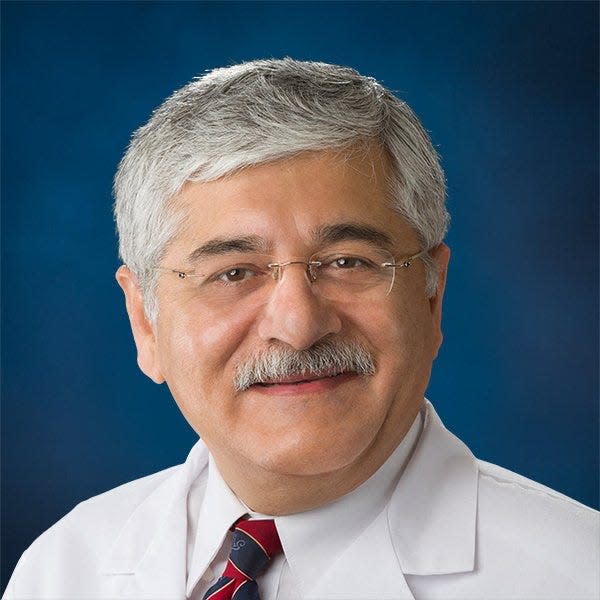RSV, flu and COVID-19: What you need to know about the viruses menacing Jacksonville area

They have been around for a while, causing varying degrees of medical havoc in people's lives: respiratory syncytial virus, or RSV, flu and COVID-19.
They were expected to cause more trouble in Northeast Florida during respiratory virus season primarily in November and December. But the good news is they are not following the same schedule, which has lessened their collective impact.
"We’re preparing for and managing the so-called 'triple-demic,' which refers to when …[they] are circulating in the community together," said Dr. Shalika Katugaha, system medical director of infectious diseases for Baptist Health. "Fortunately, all three viruses are not peaking at the same time."
USA Today: What parents should know about RSV in infants and kids
Flu season: Flu may be coming back with a vengeance, experts say, and children could be at risk
RSV hospitalizations: RSV in infants and kids is threatening hospital capacity
RSV infections peaked early and cases are declining across the country and in North Florida, she said, while seasonal flu is "elevated" and likely not yet peaked. Meanwhile, COVID-19, which first arrived in the U.S. in 2019, continues to "simmer in the background," with low infection levels in the region, she said.

In the Jacksonville area, the percentage of positive RSV tests has been as high as 18% this season but has since dropped to about 9%, according to Dr. Mobeen Rathore, chief of UF Health Jacksonville's Division of Pediatric Infectious Diseases and Immunology. The percentage of positive flu tests this season has hovered around 30%, he said.
Some hospitals across the country reported being overwhelmed with RSV and influence cases. But Jacksonville-area hospitals still have plenty of capacity, hospital leaders said.
"States all around us are much worse than Florida," Rathore said.
Here's what you need to know:
How do you tell RSV, flu and COVID-19 apart?
RSV, flu and COVID-19 are all respiratory viruses that can strike with varying severity and all ages can get them.
All three "and the common cold share many of the same symptoms, including runny nose, sore throat, congestion and cough," Katugaha said. "The only way to distinguish the viruses with certainty is to get tested."
But she offered some key characteristics of RSV.
"Wheezing is often a hallmark sign of a serious RSV infection, usually in children or older adults," she said. "If you hear your loved one wheezing, please contact your health care provider. If there is any difficulty breathing, go to the nearest emergency center."
World Pneumonia Day: Respiratory illness in children can lead to hospitalization, death
Mayo expert: Two years later as cases drop, COVID-19 is likely to become an endemic
Rathore said most children get RSV by age 2.
The younger they are, the more severe it can be, he said. The number of children who get it is much higher than most other age groups.

The populations most vulnerable to RSV are babies, children with lung disease, adults aged 65 and older and people with weak immune systems. Adults who feel sick but are not in a high-risk group are more likely to have the flu or COVID-19, Katugaha said
Also, flu symptoms tend to develop more suddenly than RSV or COVID-19, with an abrupt fever and a shorter period between exposure and symptoms, she said.
How can we avoid them?
The Centers for Disease Control and Prevention recommends these "common-sense" measures: Avoid people who are sick, stay home when you are sick, cover your mouth and nose during coughs and sneezes and wash your hands for at least 20 seconds with soap and water.
Other preventive measures are staying up to date on recommended vaccines; improving ventilation in your home, office, schools and other settings; and wearing a mask with the best fit, protection and comfort.
What is the treatment for RSV, flu or COVID-19?
There are no specific treatments. But over-the-counter fever reducers and pain relievers, such as acetaminophen or ibuprofen, can manage symptoms. Also, drinking plenty of fluids can prevent dehydration.
Never give aspirin to children and consult a health care provider before giving them nonprescription cold medicines. Some medicines contain ingredients that are not good for children.
When to call a doctor?
Seek medical help if an adult or a child is having difficulty breathing, not drinking enough fluids or experiencing worsening symptoms, according to Katugaha.
Vaccines are available for influenza and COVID-19. What about RSV?
Vaccines and antiviral drugs are being developed to treat RSV but none is available yet, according to the CDC. A vaccine might be possible in the next year or so.
RSV vaccine: Thousands of babies and children are hospitalized by RSV every year. Why that could soon change.
Combo shot: A combination vaccine for flu and COVID-19 is in the works. Here's what to know.
How late in the season is the flu vaccine effective?
"The vaccine can be effective as long as flu viruses are circulating," Katugaha said. "It’s not too late to get the flu vaccine now. Flu is unpredictable and seasons can vary. While the flu typically peaks between December and March, cases can occur as late as May."
Health insurance covers the $35 to $55 cost of a flu shot. An annual Duval County Medical Society-led campaign called #FluVaxJax provides vouchers for area residents who are uninsured: to get one, go to dcmsonline.org/page/fluvaxjax.
Health care in an RV: Hospital's mobile ministry is on the road to help end health disparities
Community health assessment: Nagging issues, inequities, opportunities for action revealed in Jacksonville area
The typical flu vaccination rate in the Jacksonville area is 36.9%; the campaign helped boost the rate to 48.5% last year.

"Our goal is to encourage vaccinations and educate folks on the safety and effectiveness with the hope of reducing hospitalizations as a result of the flu," said Dr. Sunil Joshi, an allergy and immunology specialist and society leader. "Keeping the rate in the upper 40 to 50% range would be great."
Some people are wary of vaccines. How important are they?
Flu and COVID-19 vaccines lessen the chance of severe disease, hospitalization and death. Everyone older than 6 months of age should get the flu vaccine and also is eligible for a COVID-19 vaccine.
"COVID-19 vaccine fatigue and hesitancy have impacted flu vaccination rates," Katugaha said. "Flu vaccination rates as of November 2022 are similar in adults and children to flu vaccination rates in 2021. However, seasonal flu activity is elevated across the country and higher than in 2021, so it’s more important than ever to get a flu shot this season."
During a holiday season of gatherings and cooler temperatures, "it’s important that our community stay virus-savvy and careful," she said.
bcravey@jacksonville.com, (904) 359-4109
TO LEARN MORE
For more information, go to:
cdc.gov/flu/about/keyfacts.htm
cdc.gov/coronavirus/2019-ncov/index.html
And here is information from a Nov. 29 CDC webinar on the current convergence of RSV, flu and COVID-19: emergency.cdc.gov/epic/pdf/2022/112922_slides.pdf.
This article originally appeared on Florida Times-Union: RSV, flu, COVID-19: Virus trio impact less across Jacksonville area

